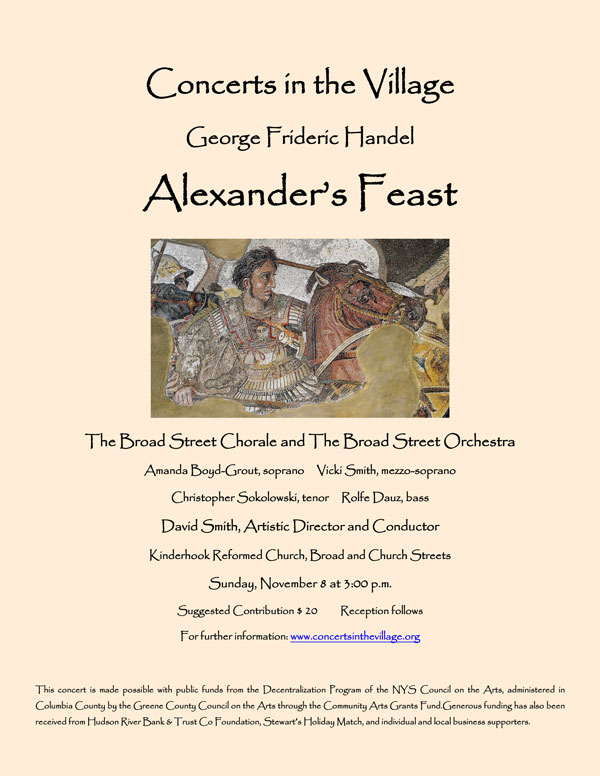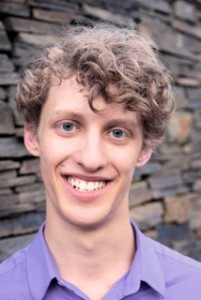Alexander’s Feast
by George Frideric Handel
Sunday, November 8 at 3:00 p.m.
21 Broad Street, Kinderhook, NY
David Smith, Artistic Director and Conductor

Amanda Boyd-Grout
Her voice described by critics as resplendent, sweet-toned, brilliant, impressive, glorious and outstanding, soprano Amanda Boyd-Grout has been hailed by critics as one of Britain’s rising stars.
Boyd-Grout trained at the Guildhall School of Music and Drama and at the National Opera Studio in London where she was coached and mentored by Elizabeth Vaughan and Dame Janet Baker.
Known for her work in contemporary music, Amanda has appeared as Maeve in the world premiere of Deirdre Gribbin’s Hey! Persephone for the Almeida and Aldeburgh Festivals, as Duende in the world premiere of Simon Holt’s A Nightingale’s To Blame for Opera North UK, and in Edward Barnes’ one-woman opera The Vagabond Queen for Hudson Chamber Opera. As a solo concert artist Amanda has sung under the batons of Sir Simon Rattle and Sir David Willcocks.
In addition to gracing the operatic stage, Amanda played the title role in the film Lucia (based on Sir Walter Scott’s The Bride of Lammermoor and Donizetti’s Lucia di Lammermoor). She also headlined for the band, The Art of Noise, in a USA tour, singing fragmented Debussy songs. www.amandaboyd.com
Vicki Smith
Vicki Smith (mezzo-soprano) began formal voice studies five years ago with Amanda Boyd-Grout. An active choral singer since college, and a member and manager of the first Tanglewood Festival Chorus in 1970, Ms. Smith has appeared with Concerts in the Village on various occasions, as well as in area churches and in recital. She has performed works of Handel, Haydn, Mozart, Lili and Nadia Boulanger, Gaubert, Chausson, Bizet, Spohr, Messaien, J.S. Bach and many others. She was the soprano soloist for the American premiere of the J.C Bach Miserere in 2013, and appeared as Second Woman in Purcell’s Dido & Aeneas in 2014 in Kinderhook and at PS21 in Chatham.
Rolfe Dauz
Rolfe Dauz’s recent engagements include the role of Betto (Gianni Schicchi) with Opera San Jose,Don Alfonso (Cosi fan tutte), Figaro(The Marriage of Figaro) with Notre Dame de Namur University, San Francisco Pocket Opera and the San Francisco Conservatory of Music, Claudio(Agrippina) at the San Francisco Conservatory of Music, Leporello(Don Giovanni) with San Francisco Parlor Opera and at the San Francisco Conservatory of Music.His other roles include Achilla (Giulio Cesare), Hermann and Schlemil (Les contes d’Hoffman), the Jailer (The Rake’s Progress), Trooper (Firebird Motel by David Conte), Mars (Orpheus in the Underwold) and Henry (Gift of the Magi by Conte).
Mr. Dauz received his Bachelor of Music degree in Vocal Performance at the San Francisco Conservatory of Music in the spring of 2011. In the summer of 2013, he participated in the Castleton Artist Training Festival in Castleton, Virginia founded by Maestro Lorin Maazel. At Castleton, Rolfe covered the role of Bello in Fanciulla del West.Last January, Rolfe recently made his Opera McGill debut as Figaro in Le nozze di Figaro.Mr. Dauz is a first year graduate student of the Vocal Arts Programat Bard College and heis currently studying with Sanford Sylvan.
Christopher Sokolowski
Tenor Christopher Sokołowski is a native of New York’s Hudson Valley, and has sung a wide repertoire of both concert and operatic works. He has performed roles including Acis (Acis and Galatea), Oronte (Alcina), Henrik (A Little Night Music), Alfred (Die Fledermaus), Tamino (Die Zauberflöte), Mari (Les mamelles de Tirésias), and concert works such as Orff’s Carmina Burana, Vaughan William’s On Wenlock Edge, Handel’s Messiah, Weber’s Jubelmesse, Bach’s Magnificat, Mendelssohn’s Elijah, Mozart’s Requiem, Vivaldi’s Dixit Dominus, Handel’s Esther, and Britten’s War Requiem. In 2013 he created the role of Thiện Sĩ in the world premiere of P.Q. Phan’s Tale of Lady Thị Kính, and sang the world premiere of Phan’s Vietnamese Requiem in April of 2015. He was a prizewinner in the S. Livingston Mather and Orpheus Vocal Competitions, earned his B.M. from SUNY Purchase, and his M.M. from Indiana University Jacobs School of Music where he was an Associate Instructor of Voice. www.christophersokolowski.com
Featuring
-
Amanda Boyd-Grout, soprano
-
Vicki Smith, mezzo-soprano
-
Christopher Sokolowski, tenor
-
Rolfe Dauz, bass
Kinderhook Reformed Church
Broad and Church Streets
Kinderhook, NY
Suggested Contribution $20
Reception follows
Kinderhook Reformed Church
Concerts in the Village (CITV) begins its sixth season at 3:00 p.m. on Sunday, November 8th with George Frideric Handel’s oratorio Alexander’s Feast, or the Power of Music.
The concert at historic Kinderhook Reformed Church in the Village of Kinderhook features 60 performers, including The Broad Street Chorale, The Broad Street Orchestra, and guest soloists Amanda Boyd-Grout, Vicki Smith, Christopher Sokolowski, and Rolfe Dauz. CITV draws the largest audiences for classical music in Columbia County, typically numbering 200 to 300 listeners.
Says CITV artistic director David Smith: “We have become a true musical ‘academy,’ a consortium of experienced non-professional and professional instrumentalists and vocalists, coming together to share our musical passion with the public.” Smith, who studied music theory and performance at both Harvard and Yale and trained in France with the famed Nadia Boulanger, is an experienced conductor, pianist, and organist/harpsichordist, as well as music scholar.
Acclaimed local soprano and voice teacher Amanda Boyd-Grout and the mezzo-soprano Vicki Smith are well-known to area audiences and have performed for Concerts in the Village on many occasions, most recently in the 10th Annual Paul Grunberg Memorial Bach Concert at PS21. In 2014 Boyd-Grout was featured in the role of Dido in CITV’s production of Purcell’s Dido and Aeneas, both in Kinderhook and at PS21 in Chatham.
With Alexander’s Feast, tenor Christopher Sokolowski makes his CITV debut. A native of the Hudson Valley, Sokolowski most recently performed Britten’s Serenade for Tenor, Horn and Strings, in Bloomington, Indiana and next April will be featured in Carmina Burana.
Baritone Rolfe Dauz, also making his CITV debut, is a student at Bard’s graduate vocal program, where he works with the distinguished soprano Dawn Upshaw. His many operatic roles have included Figaro and Leporello in San Francisco, and Puccini’s Betto in Montreal.
As noted by both audiences and critics, Concerts in the Village offers an imaginative repertoire, high-energy performances, and some intriguing performance venues: in April 2015 CITV presented the first concert at Jack Shainman Gallery: The School, an exciting new Kinderhook arts space with regional draw.
Music critic John Paul Keeler has written in Register –Star (Hudson): “Concerts in the Village is fast becoming a major Columbia County musical treasure.”
Suggested contribution of $ 20 includes a reception immediately following the concert at the church, which is located at the corner of Broad (US Route 9) and Church Streets in the Village of Kinderhook, NY.
This concert is made possible with public funds from the Decentralization Program of the NYS Council on the Arts, administered in Columbia County by the Greene County Council on the Arts through the Community Arts Grants Fund.Generous funding has also been received from Hudson River Bank & Trust Co Foundation, Stewart’s Holiday Match, and individual and local business supporters.
ALEXANDER’S FEAST
by Pat Marshall, CITV Soprano
Hear how Timotheus’ various lays surprise,/ And bid alternate Passion fall and rise;
While, at each Change, the son of Libyan Jove/ Now burns with Glory, and then melts with Love;
So begins the plot summary by another Alexander [Pope] of another Alexander’s Feast [Dryden’s] that appeared on the wordbook for Handel’s wildly successful premiere in London, 1736, of the musical drama we perform today in Kinderhook.
The dramatic date of this “secular oratorio” places us far back in Greek history, to 331 BCE, immediately after Alexander’s great victory over Persia. King Darius is dead and Persepolis, his once invincible capital, taken. There, in the conquered city, Alexander, Philip’s warlike son sits aloft/ …On his imperial throne with lovely Thais by his side. With these words, the tenor prepares us for the joyous opening as he, soprano and chorus sing to the “Happy, happy” pair, Alexander the brave and Thais the fair.
Timotheus, the bard, now enters with his lyre to praise the conqueror in traditional heroic mode. The king, he boasts, is child of Jove himself who once, taking a dragon’s fiery form curled ‘round the s’ender waist of Olympia… and …there stamp’d the image of himself, a sovereign of the world, his son, Alexander.
The crowd, with listening ears attends as Alexander, stirred by the bard’s lofty praise, assumes an appropriately godlike pose. Sovereign and conqueror of the world, he has nonetheless been conquered by lyric monody. Timotheus goes on, pleasing his soldier king next with rowdy praise of Bacchus, the soldier’s delight. Again the young monarch succumbs to song: he grows vain, reliving his victorious battles in memory, routing his foes and slewing the slain all over again.
But Timotheus remains master and checks Alexander’s prideful recollections by changing his rhythm from Bacchic revelry to mournful elegy. He now sings of fallen Darius as a man great and good whose fate was too severe. The crowd and Alexander are subdued by this reminder that fate is fickle: once enthroned like Alexander, Darius now lies on bare earth expos’d…with not a friend to close his eyes. Alexander responds as Achilles, his own hero, did, pitying the enemy he has himself destroyed. And again the poet’s deep understanding of human nature prevails for, aware that pity melts the mind to love, the bard reminds his king that lovely Thais sits beside him. Take the good the gods provide, he advises. All applaud, rejoicing that love has been crowned and music won the cause. End Part I.
As Part II begins, Alexander sleeps. He must be awakened: Rouse him! But his waking is to a new mood of anger. Once again Timotheus changes the rhythms of his lyre, rousing the young king to vengeful purpose. Alexander seizes a torch with zeal to destroy, as Thais leads the way, another Helen, to fire another Troy, to burn Persepolis down.
Thus, long ago, /Timotheus, to his breathing flute
And sounding lyre/ Could swell the soul to rage… [Dryden]
But at last divine Cecilia came! Saint of the organ, she enlarges the former narrow bounds of vocal music by adding harmonies drawn from heaven itself. She brings to the feast music never heard before, in harmonies far beyond Timotheus’ lyric repertoire. Let old Timotheus yield the prize or, better, let both divide the prize. For, while Cecilia has brought an angel down the old bard did raise a mortal to the skies!
So we raise our final chorus, as Handel-Cecilia wrote it for us:
MAY THIS EVENING EVER PROVE
SACRED TO HARMONY, SACRED TO LOVE!





